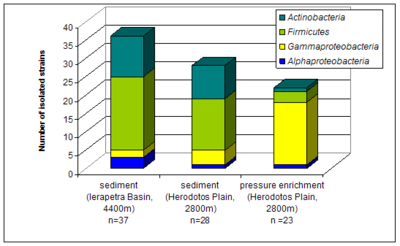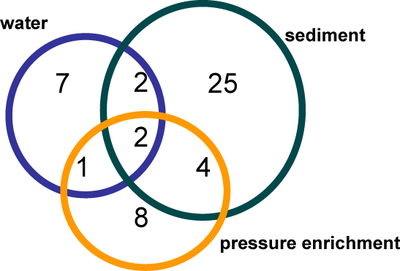OceanRep
Isolation and characterisation of bacteria from the Eastern Mediterranean deep sea.
Gärtner, Andrea, Blümel, Martina, Wiese, Jutta  and Imhoff, Johannes F.
and Imhoff, Johannes F.  (2011)
Isolation and characterisation of bacteria from the Eastern Mediterranean deep sea.
Antonie van Leeuwenhoek International Journal of General and Molecular Microbiology, 100
(3).
pp. 421-435.
DOI 10.1007/s10482-011-9599-5.
(2011)
Isolation and characterisation of bacteria from the Eastern Mediterranean deep sea.
Antonie van Leeuwenhoek International Journal of General and Molecular Microbiology, 100
(3).
pp. 421-435.
DOI 10.1007/s10482-011-9599-5.
|
Text
fulltext.pdf - Published Version Restricted to Registered users only Download (1MB) | Contact |
|
![[thumbnail of 10482_2011_9599_MOESM1_ESM.png]](https://oceanrep.geomar.de/12353/2.hassmallThumbnailVersion/10482_2011_9599_MOESM1_ESM.png)  Preview |
Image
10482_2011_9599_MOESM1_ESM.png - Supplemental Material Download (6kB) |
![[thumbnail of 10482_2011_9599_MOESM2_ESM.png]](https://oceanrep.geomar.de/12353/3.hassmallThumbnailVersion/10482_2011_9599_MOESM2_ESM.png)  Preview |
Image
10482_2011_9599_MOESM2_ESM.png - Supplemental Material Download (27kB) |
Abstract
The Eastern Mediterranean deep sea is one of the most oligotrophic regions in the world’s ocean. With the aim to classify bacteria from this special environment we isolated 107 strains affiliating to the Gammaproteobacteria, Alphaproteobacteria, Firmicutes, Actinobacteria and Bacteroidetes from sediments of the Eastern Mediterranean Sea. As determined by 16S rRNA gene sequence analysis, Actinobacteria and Firmicutes, in particular members of the genus Bacillus, were dominant and represented a remarkable diversity with 27 out of a total of 33 operational taxonomic units obtained from the untreated sediment. The considerable percentage of operational taxonomic units (42%) which may be considered to be new species underlines the uniqueness of the studied environment. In order to selectively enrich bacteria which are adapted to the deep-sea conditions and tolerate broad pressure ranges, enrichments were set up with a sediment sample under in situ pressure and temperature (28 MPa, 13.5°C) using N-acetyl-d-glucosamine as substrate. Interestingly Gammaproteobacteria were significantly enriched and dominant among the strains isolated after pressure pre-incubation. Obviously, Gammaproteobacteria have a selective advantage under the enrichment conditions applied mimicking nutrient supply under pressure conditions and cope well with sudden changes of hydrostatic pressure. However, under the continued low nutrient situation in the Eastern Mediterranean deep-sea sediments apparently Firmicutes and Actinobacteria have a clear adaptative advantage.
| Document Type: | Article |
|---|---|
| Additional Information: | WOS:000294905900011 |
| Keywords: | Microbiology; Deep sea; Bacteria; Mediterranean sea; Pressure-incubation; Cultivation; GRAM-POSITIVE BACTERIA; MARINE BACTERIOPLANKTON; ACTINOMYCETE DIVERSITY; GROWTH-CHARACTERISTICS; MICROBIAL COMMUNITY; MARIANA TRENCH; PACIFIC-OCEAN; SEDIMENTS; BACILLUS; DECOMPRESSION |
| Research affiliation: | Kiel University OceanRep > GEOMAR > FB3 Marine Ecology > FB3-MI Marine Microbiology OceanRep > GEOMAR > Applied R&D > Centre for Marine Substances (KiWiZ) |
| Refereed: | Yes |
| Open Access Journal?: | No |
| Publisher: | Springer |
| Projects: | Future Ocean |
| Date Deposited: | 13 Oct 2011 07:44 |
| Last Modified: | 23 Sep 2019 23:23 |
| URI: | https://oceanrep.geomar.de/id/eprint/12353 |
Actions (login required)
 |
View Item |
Copyright 2023 | GEOMAR Helmholtz-Zentrum für Ozeanforschung Kiel | All rights reserved
Questions, comments and suggestions regarding the GEOMAR repository are welcomed
at bibliotheksleitung@geomar.de !


 Tools
Tools Tools
Tools
